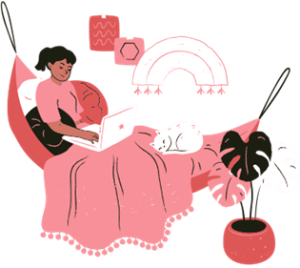In this blog, EDIT Lab Postdoc Meg Skelton describes internet-delivered psychological treatments for anxiety and depression.
Anxiety and depression are common, disabling, conditions. Although medication and psychological (or ‘talking’) therapies can work, not everyone seeks help or is able to access it when they do. Internet-delivered psychological therapies offer one avenue to improving treatment access by offering flexibility that traditional face-to-face therapy doesn’t; all you need to attend is a suitable device and internet connection. For example, internet-delivered therapy can be offered outside of normal office hours and doesn’t require transportation to another location, which might be too far away or difficult to get to for individuals with physical disabilities. The NHS and NICE are in the process of assessing which digitally enabled therapies are suitable for use within NHS Talking Therapies for anxiety and depression (formerly ‘IAPT’) services, with therapist support; mainstream digitally enabled care is part of the NHS Long Term plan.
We previously published a blog on internet-enabled cognitive-behavioural therapy (CBT), but given the continued rise in internet-delivered therapies, decided to write a more general description. Internet-delivered treatments can be app or website-based. The materials they provide can include multimedia such as psychoeducational videos, relaxation techniques, and questionnaires or worksheets. These materials might be organised into modules with a certain structure and order to be completed in. Different providers follow principles of different therapeutic approaches, but most tend to be based on CBT, which is the first-line psychological treatment for anxiety and depression used in the NHS. Another key way in which treatments differ, is the level of support provided:
Treatments can be purely unguided self-help or a therapist might provide asynchronous support through weekly emails or a phone call to answer any questions. By asynchronous, I mean, they’re not guiding you through the materials at the same time that you’re completing them. This gives full flexibility for you to complete the materials whenever and however suits you, even if that’s doing 20 minutes at 2am with your cat on the bed. It also frees up therapists to take on more patients, which is crucial given that there are not enough trained therapists to meet the high demand for psychological treatment. However, although evidence indicates that internet-delivered therapy is as effective as face-to-face therapy (1,2), ‘unguided’ internet-delivered therapies with no support may not be as effective as guided versions, and drop-out before completing all the modules or materials is more likely (3,4).
whenever and however suits you, even if that’s doing 20 minutes at 2am with your cat on the bed. It also frees up therapists to take on more patients, which is crucial given that there are not enough trained therapists to meet the high demand for psychological treatment. However, although evidence indicates that internet-delivered therapy is as effective as face-to-face therapy (1,2), ‘unguided’ internet-delivered therapies with no support may not be as effective as guided versions, and drop-out before completing all the modules or materials is more likely (3,4).
Synchronous guided internet-delivered therapy (‘internet-enabled therapy’) is the most similar to traditional face-to-face therapy. This happens in real-time with an accredited therapist over the internet, via a confidential chat or video-based platform. This is a natural succession to phone-based therapy, which has been used for many years. Advantages to internet-enabled therapy over phone-based include the ability to share other materials during the session (e.g., files), or in the case of video calls, see facial expressions and body language. Chat-based treatment easily allows for de-identified conversations to be analysed using machine learning techniques, to identify elements associated with better outcomes (5). One such provider of chat-based treatment to NHS patients is ieso. We are working with ieso on a number of projects, most recently one looking at patient trajectories of symptoms and functioning during therapy. That’s coming up next!
References
- Andersson G, Titov N, Dear BF, et al. Internet-delivered psychological treatments: from innovation to implementation. World Psychiatry 2019; 18: 20–28.
- Andrews G, Basu A, Cuijpers P, et al. Computer therapy for the anxiety and depression disorders is effective, acceptable and practical health care: An updated meta-analysis. J Anxiety Disord 2018; 55: 70–78.
- Thew GR. IAPT and the internet: the current and future role of therapist-guided internet interventions within routine care settings. Cogn Behav Ther 2020; 13: e4.
- Richards D, Richardson T. Computer-based psychological treatments for depression: a systematic review and meta-analysis. Clin Psychol Rev 2012; 32: 329–342.
- Ewbank MP, Cummins R, Tablan V, et al. Understanding the relationship between patient language and outcomes in internet-enabled cognitive behavioural therapy: A deep learning approach to automatic coding of session transcripts. Psychother Res 2020; 1–13.
Images sourced under a free licence from https://www.canva.com/


